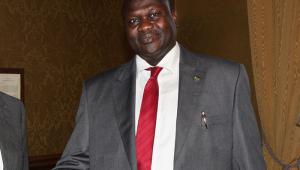Following a visit to the country completed yesterday, the fund said that without efforts from the government and support from donors, including cash for its budget, further chaos would be likely in the world’s youngest country, which has not seen stability since it was established in 2011.
A brutal civil war and the recent sharp drop in oil prices have sent the country into deep economic crisis, with inflation approaching 300%, Jan Mikkelsen, the IMF employee who led the team, explained.
“Moreover, the value of the South Sudanese pound has dropped by close to 90% since the exchange rate liberalisation in December 2015, while central bank international reserves have dwindled to a few days of import coverage.”
Mikkelsen warned that “if macroeconomic policies do not change”, the situation would deteriorate further, adding to an already dire humanitarian situation.
He said that this year’s deficit could top $1.1bn – 25% of GDP. If the country financed this through central bank borrowing or by accumulating arrears, it would only fuel inflation further and push the exchange rate down.
The government must raise non-oil revenue, cut spending – particularly in its payroll, current operations, travel and investment – and tighten expenditure controls, the fund said.
These measures could reduce the fiscal gap to around $300m, according to Mikkelsen, but the government could not cover the rest without falling short on its obligations, including expenses related to the peace agreement.
Restoring economic stability therefore required “collaborative efforts” from both South Sudan and its development partners, he stressed.
“Strong policy efforts could lay the basis for donors to play a role in providing support to close the fiscal gap, including through budget support.”
He called on the government to implement a stronger public financial management framework and increase transparency in its financial transactions to encourage this, as well as to preserve peace and the rule of law.
The IMF stressed that the country’s fragile peace agreement, signed in August 2015 and implemented this year after months of delays and ceasefire breaches, could be threatened by further declines in the economic situation.
“However, political reconciliation must now be consolidated and the [unity government] should work as a cohesive government for it to chart a new course towards broad-based and inclusive economic development,” said Mikkelsen.
“Demonstrating unity and commitment in the coming months to economic stabilisation and strengthening public financial management will be key steps to rebuilding policy credibility and regaining access to external financial support.”
South Sudan’s two-year civil war came to a tentative end in April when the rebel leader, Riek Machar, returned to the country’s capital to form a transitional, power-sharing government with his long-time rival, president Salva Kiir.
In the two years since their political power struggle sparked a bloody and ethnically divisive conflict in 2013, the fighting killed tens of thousands and drove more than two million people from their homes.
Today, although the violence has finished, the fallout from the war remains, with economic crisis, poverty and humanitarian suffering a feature of daily life for South Sudanese citizens.













